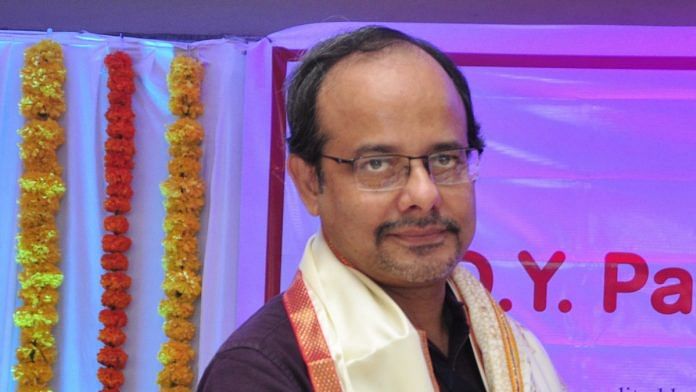New Delhi: The Indian Council of Medical Research (ICMR)-National Aids Research Institute (NARI) — the body responsible for conducting WHO’s Solidarity trial in India — plans to continue testing remdesivir, even though the drug didn’t show encouraging results in the interim analysis released in October.
Dr Samiran Panda, director of ICMR-NARI, told ThePrint in an exclusive interview, that the interim analysis on remdesivir was only “indicative”, and testing the drug further on more Covid-19 patients would help in drawing better conclusions.
The interim findings of the multi-country trial revealed that none of the four repurposed drugs that it examined — remdesivir, hydroxychloroquine (HCQ), lopinavir and interferon — had any effect on reducing the number of deaths among Covid patients. But Dr Panda said a bigger sample size was required to confirm the findings.
“A larger sample size adds to the power of a clinical trial and helps in making decisions on a firmer ground. It is therefore prudent to achieve the same in any trial,” said Panda, who also heads the Division of Epidemiology & Communicable Diseases at ICMR.
“ICMR’s National Task Force for Covid-19 is watchful about all these developments and will modify its treatment guidelines as appropriate, in a timely manner.”
ICMR said as on 15 October 2020, the trial in India comprised 26 sites with 937 participants. Until 8 November , a little over 250 patients had been given remdesivir to test its efficacy.
Also read: Final results of US trial reveal remdesivir could shorten recovery time in Covid patients
Covaxin launch only possible in 4-6 months
The launch of a vaccine, such as ICMR-Bharat Biotech’s Covaxin, can happen only when Phase-III clinical trial data clearly indicates its efficacy, Panda said.
“This, at the minimum, will require four to six months,” he said.
But he added that “emergency use authorisation (EUA), if approved by the Drug Controller General of India (DCGI), can provide the vaccine even earlier to people who need it most”.
Future of Solidarity trials
While the Solidarity trial has not found a treatment for Covid-19, it has definitely not taken the global therapeutic community back to ‘point zero’, Panda emphasised.
“Rather, it helped us move forward with confidence, as we know now what works and what does not. It must be appreciated that incremental accumulation of knowledge is the order of science we practice,” he said.
He explained, “In evidence-based practice of medicine, it is essential that we examine and re-examine the range of treatment options we have in hand, and discard some of them in the light of newly emerging evidence.”
Panda added that it is important to examine the efficacy of acalabrutinib, a cancer drug manufactured by British drug major AstraZeneca and branded as ‘Calquence’, with a multi-country trial platform such as the Solidarity trial.
“ICMR closely watches all the scientific developments taking place globally regarding Covid-19, and quickly gets its act together to examine if various claims hold ground under scientific scrutiny and validation,” said Panda, who is considered a leader in the field of HIV prevention and care in South Asia.
“Many times, the severe stage of the Covid-19 is accompanied by hyper-inflammatory syndrome that causes havoc, leading to various complications and even death. Acalabrutinib has the potential to combat hyper-inflammation,” he said, linking early data from a clinical study published in the medical journal Science Immunology.
The study showed that the drug worked by blocking the Bruton tyrosine kinase (BTK) protein, and provided clinical benefit to a small group of patients with severe Covid-19.
Also read: Approved by US, rejected by WHO — science of remdesivir & why it has turned controversial




mediclaim insurance companies are trying hard to prove inj remdesivir is not useful via ICMR as these insurance companies will have to pay high prices for injection remdesivir ,as already US FDA has authorised remdesivir then what’s wrong with icmr to give approval india , because every critical patients will go for remdesivir & whichever drugs available to survive as many pts are dying in govt hospitals ,this is big conspiracy , if govt brings down cost of remdesivir then mediclaim insurance companies will pay for the claim